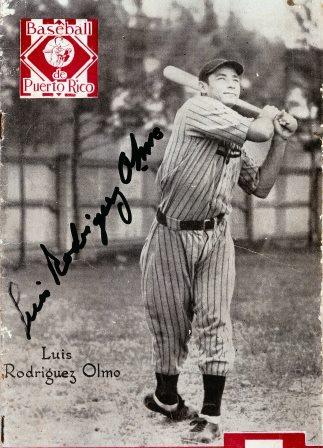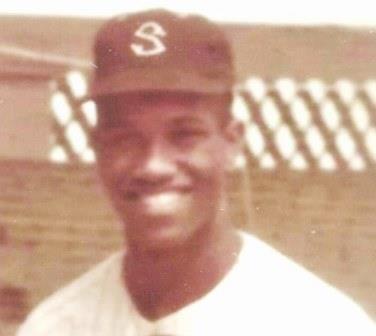
When Luis Rodríguez Olmo was born a century ago in Arecibo, Puerto Rico, August 11, 1919, this Island gave birth to a baseball icon admired and cherished throughout his beautiful Island, Cuba, the Dominican Republic, Mexico, Panamá and Venezuela, as well as by Brooklyn Dodgers fans in the 1940s. Olmo was the second MLB player from Puerto Rico when he joined the 1943 Brooklyn Dodgers, post-Hiram Bithorn—who debuted with the 1942 Chicago Cubs.
Details on Olmo’s life and baseball career can be found in his excellent SABR bio written by Rory Costello at https://sabr.org/bioproj/person/a26bda17. Olmo’s semi-pro baseball career began in Caguas, Puerto Rico, November 13, 1938, with the Caguas Criollos in game two of their Sunday double header with the Mayagüez Indios. His first hit was a double off LHP José Antonio Figueroa—who led the brand new Puerto Rico Semi-Pro League in strikeouts. Caguas’ home field was an open area set-up next to José Gautier Benítez High School. Olmo impressed Caguas player-manager José “Pepe” Seda with a .335 BA and .497 SLG as a 19-year old rookie. The Criollos finished fifth of six clubs at 16-24, 12.5 games behind first-place Guayama (27-12), who also won the championship.
Olmo’s rookie salary with Caguas was seven dollars per week, per our 1992 conversation in his Santurce home on Figueroa Street, a working class neighborhood. His nickname was “El Jíbaro,” loosely translated as hillbilly, but he was very intelligent with common sense. Olmo continued his fine play for Caguas in 1939-40, with a .291 BA and .413 SLG. His 16 doubles tied him with Mayagüez’s Dan Wilson for fourth-place, behind Caguas’ Pedro Díaz (19), Ponce’s Pancho Coímbre (18) and Guayama’s Tetelo Vargas (17). The semi-pro league’s best pitchers were Negro Leaguers, e.g., Satchel Paige (19-3, 1.93 ERA for Guayama, with 205 strikeouts in 208 IP); Billy Byrd of Santurce; Roy Partlow of San Juan; and Aguadilla’s Leon Day. Guayama (39-17) and San Juan (38-18) played for the title, and the Brujos (Witches) swept San Juan in four straight. Caguas (23-33) and the other seven clubs primarily played Sunday doubleheaders in the 28-week season. Olmo played against/interacted with Josh Gibson, the legendary Santurce catcher; Perucho Cepeda, the Guayama superstar shortstop and father of two-year old Orlando Cepeda; San Juan’s CF Eugene “Bicicleta” Benson; and many other outstanding players.
In 1940-41, Caguas won their first title after a 27-15 regular season and dramatic seven-game finals versus the Santurce Crabbers. Olmo’s 10 triples paced the league; he had 38 RBIs, a .302 BA and an excellent .547 SLG. He hit 10 doubles and four HR. In game six of the league finals, be bunted for a single to load the bases in the home fifth off Luis Raúl Cabrera. Teammate Roy Campanella then hit a grand slam to put Caguas ahead (5-2) en route to a 14-2 win. Ecstatic Caguas fans interrupted the game to take up a cash collection for Campanella and made sure he received the money, per Héctor Barea, Caguas’ nine-year old batboy then. “After this [morning] game, I went with my dad, Salvador, and the Caguas President, Mr. Delgado Márquez, to have lunch at the house of Don Heraldo Lizardi, a family friend and brother-in-law of Luis Olmo,” said Barea. “We were on the verge of winning a title…and did win it.” Caguas won game seven, 6-2, when Billy Byrd outpitched Raymond Brown, a future Cooperstown inductee.
Puerto Rico’s league became known as a professional baseball league in 1941-42, after three seasons as a semi-pro one. The 44-game season was split into two halves, with Ponce winning both to claim the title. Olmo’s .304 BA, seven HR, 24 RBIs and .544 SLG were solid for a 21-23 ball club tied with Santurce for fifth. Olmo represented the Northeast All-Star team, along with other stars from Caguas (Byrd, Campanella, Sammy Céspedes, Manolo García); Santurce (Cabrera, Ray Dandridge, Josh Gibson, Vidal López); San Juan (Monte Irvin, Gerardo Rodríguez, Freddie Thon Sr., Bill Wright), plus Humacao’s Willard Brown. The Southeast squad comprised Aguadilla (Leon Day-Willie Wells), Guayama (Barney Brown-Quincy Trouppe), Mayagüez (Buster Clarkson) and Ponce (Coímbre-Raymond Brown-Howard Easterling) stars.
The Northeast All-Stars won both contests, but more importantly for Olmo, this level of competition gave him a chance to showcase his skills to Stateside scouts and MLB officials.
The Puerto Rico Winter League was compressed to four teams during the next four seasons. Olmo became Santurce’s player-manager for 1942-43, at age 23! There were no imports due to World War II restrictions. Olmo was voted as the league’s MVP following a .299 BA, four HR and 25 RBIs. “It was fun managing and playing for [Santurce owner] Pedrín Zorrilla,” said Olmo. “I was 23 at the time and we had a good season. But the league was not quite as strong then compared to the earlier seasons with Caguas.” Olmo led Santurce to the first-half title and an 18-17 regular season record, before the Ponce Lions [second-half winners] bested Santurce, four games to one, in the finals. It is unclear if Olmo was in Puerto Rico for this series; he may have left the Island for spring training with the 1943 Brooklyn, per on-going research done by Jorge Colón Delgado. But Olmo did play for the Santurce-San Juan “North” team in the January 6, 1943 All-Star Game against the Mayagüez-Ponce “South” team. The North won both games.
Olmo only managed Santurce in 1943-44, per the recommendation of Branch Rickey of the Brooklyn Dodgers. The 22-22 Crabbers finished second, 15 games behind 37-7 Ponce. Olmo transitioned to the San Juan Senators for 1944-45, as a player-manager. San Juan’s 22-20 record was good for second, behind 28-11 Ponce. Olmo’s three HR tied for the league lead with Tomás “Planchardón” Quiñones and Fernando Ramos, both Ponce Lions players.
San Juan improved itself for 1945-46, signing League MVP Monte Irvin and Johnny Davis as imports. Irvin, playing 2B, crushed two homers in game one of a February 17, 1946 twin-bill versus Mayagüez and another in game two. Not to be outdone, CF Olmo also hit a HR in each contest, with the morning game one clearing the outer wall. The 23-18 Senators won the first-half, prior to defeating Mayagüez, the second-half winners, in the finals. Irvin recalled: “All I know is we won, were very happy and made some money doing it. It’s a wonderful feeling being a champion, a terrific feeling. We needed a second baseman and Olmo told me, ‘You’re fast, can hit and have a great arm, so why not?’”

